Let's have a relaxing lesson... how about:
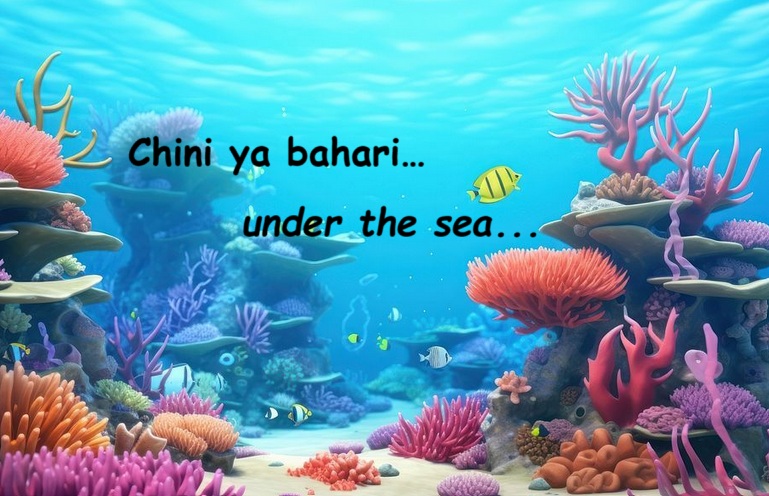
Chini ya - under
juu ya - above / on
chini ya bahari - under the sea
juu ya bahari- above the sea / over the sea
mchanga - sand (Watch out! This is an alien from a word class we haven't seen yet. Stick to my examples!)
mchanga wa bahari - sea sand
juu ya mchanga wa bahari - over the sea sand
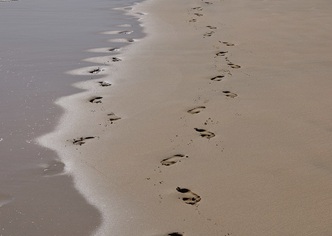
kutembea - to walk
kutembea juu ya mchanga wa bahari - to walk over the sea sand
Ninatembea juu ya mchanga wa bahari. - I walk over the sea sand.
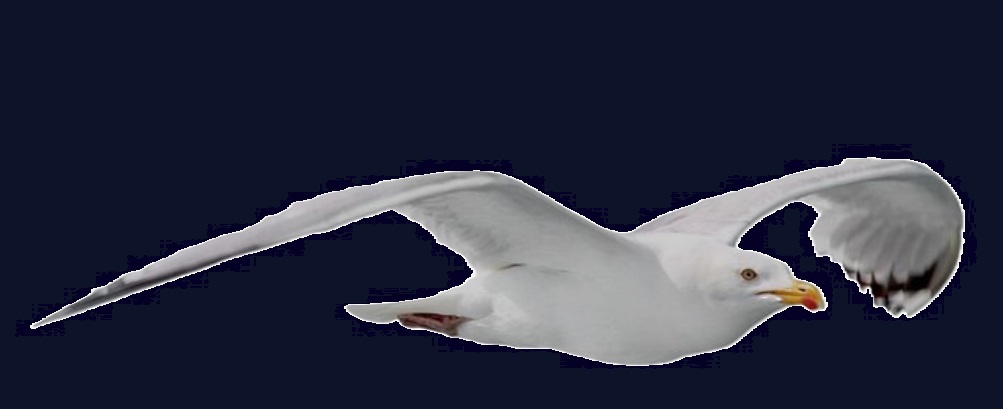
shakwe - seagull
Shakwe ni ndege.- A seagull is a bird.
kuruka - to fly
Shakwe anaruka juu ya bahari. - The seagull flies over the sea.
Shakwe anatembea juu ya mchanga. - The seagull walks over the sand.
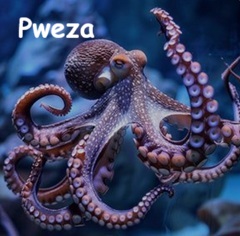
pweza - octopus
Pweza anaishi baharini.- The octopus lives in the sea.
Pweza ni mnyama mkubwa.- The octopus is a big animal.
mnyama - animal is M/Wa class; the plural is 'wanyama'
Pweza ni mkubwa sana. - The octopus is very big.
kuogelea - to swim
Pweza anaogelea chini ya maji*. - The octopus is swimming under the water.
*another intruder from a different noun class
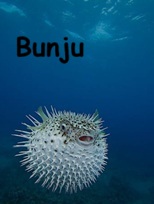
Bunju ni samaki. - The Pufferfish is a fish.
anaogopa - he is afraid
akiogopa - when / if he is afraid. - We can replace our present tense marker 'na' with 'ki' and get an if clause e.g. Nikiogopa if I am afraid Nikitembea - if I walk...
anakunywa - he drinks
atakunywa - he will drink. - We can replace our present tense marker 'na' with 'ta' and obtain future tense e.g. nitatembea - I will walk
maji mengi - a lot of water
Bunju akiogopa, atakunywa maji mengi na kuwa mkubwa zaidi. - When the pufferfish is afraid, he drinks a lot of water and becomes bigger.
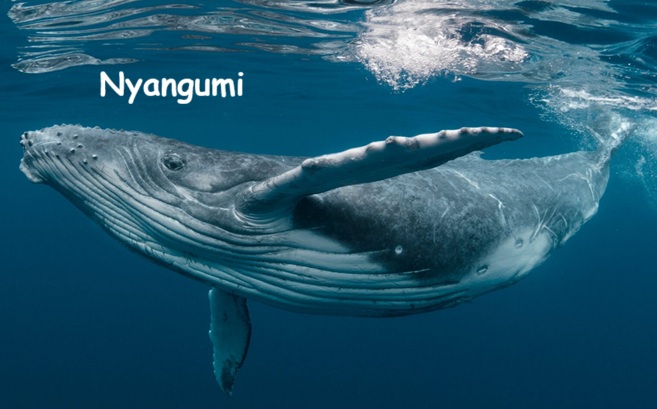
nyangumi - whale
Nyangumi si samaki. - A whale is not a fish.
mnyama - animal (M/Wa sg)
wanyama - animals (M/Wa pl)
Nyangumi ni wanyama wa bahari. - Whales are sea animals.
Nyangumi ni wakubwa sana. - Whales are very big.
kuwinda - to hunt
Watu wanawinda nyangumi. - People hunt whales.
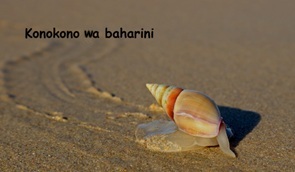
konokono wa baharini - sea snail
kuishi - to live
ambaye - which / who (M/Wa sg)
ambao - which / who (M/Wa pl)
Konokono wa baharini ni konokono ambao wanaishi baharini.- Sea snails are snails which live in the sea.
Konokono wa baharini ana nyumba. - The sea snail has a house.
Konokono wa baharini anatembea juu ya mchanga chini ya bahari. - The sea snail walks on the sand at the bottom of the sea.
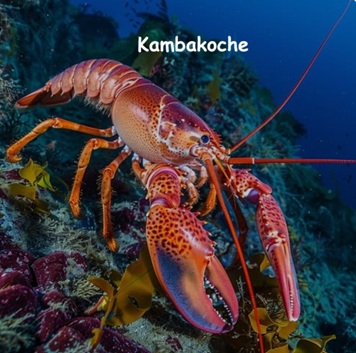
kambakoche - lobster
Kambakoche anaishi chini ya bahari. - The lobster lives under the sea.
Kambakoche anatembea juu ya mchanga. - The lobster walks on the sand.
Kambakoche ni mkali. - The lobster is fierce.
Watu wanapenda kula kambakoche. - People like to eat lobsters.
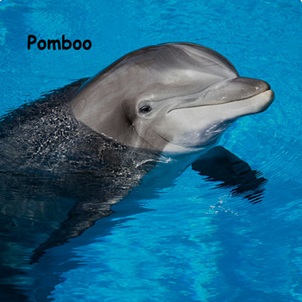
pomboo - dolphin
Pomboo wanaishi baharini - Dolphins live in the sea.
Pomboo si samaki. - Dolphins are not fish.
kuruka - to jump
Pomboo wanaogelea baharini na wanaruka. - Dolphins swim in the sea and jump.
Pomboo ni mpole sana. - A dolphin is very gentle.
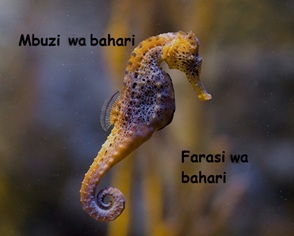
mbuzi wa bahari = farasi wa bahari - seahorse
Mbuzi wa bahari ni mnyama mdogo. - The seahorse is a small animal.
Mbuzi wa bahari ni mzuri sana. - The seahorse is very beautiful.
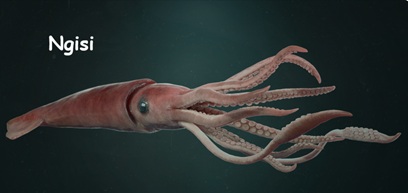
ngisi - squid
kwenye - near / in / at / on
miamba ya matumbawe - coral reef*
*intruder alert (We will treat the word class later.)Ngisi anaogelea kwenye miamba ya matumbawe. - The squid is swimming near the coral reef.
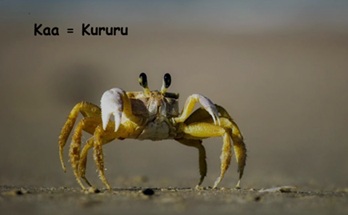
kaa = kururu - crab
mchanga wa* bahari - sea sand
* Don't worry. Mchanga is the problem... Will get to its noun class later. But how could I talk about the sea without mentionning the sand... :DKaa anatembea kwenye mchanga wa bahari. - The crab walks in the sea sand.
mwamba - rock*
* another intruder. You have seen its plural form just now in the coral reef. miamba = rocks / miamba ya matumbawe = rocks of corals = coral reefKaa anatembea kwenye mwamba. - The crab is walking on the rock.
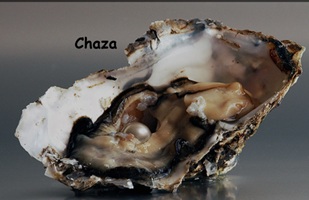
chaza - oyster
Watu wanapenda kula chaza. - People like to eat oysters.
To end this lesson I have a little surprise for you.
If you open the following you tube link you'll find a Swahili chidren's song containing most of our lesson.
Don't worry if you don't understand every word yet. That is quite normal. Just listen to the words you CAN understand and you will notice there are a lot.
https://youtu.be/UdZYVl2BCNo?feature=shared